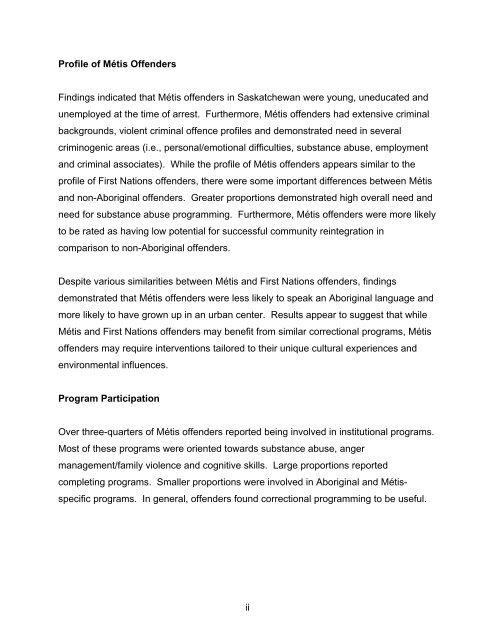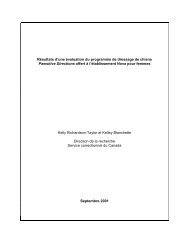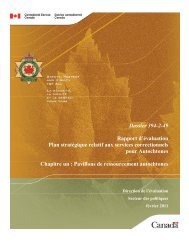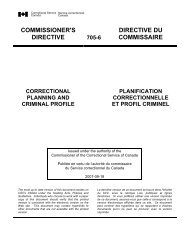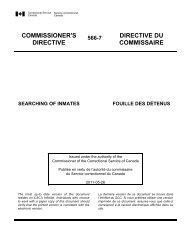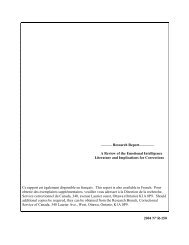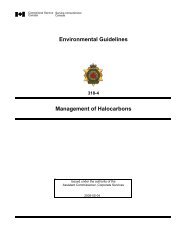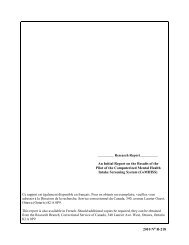Program and Service Needs of Federally Incarcerated Métis ...
Program and Service Needs of Federally Incarcerated Métis ...
Program and Service Needs of Federally Incarcerated Métis ...
Create successful ePaper yourself
Turn your PDF publications into a flip-book with our unique Google optimized e-Paper software.
Pr<strong>of</strong>ile <strong>of</strong> <strong>Métis</strong> Offenders<br />
Findings indicated that <strong>Métis</strong> <strong>of</strong>fenders in Saskatchewan were young, uneducated <strong>and</strong><br />
unemployed at the time <strong>of</strong> arrest. Furthermore, <strong>Métis</strong> <strong>of</strong>fenders had extensive criminal<br />
backgrounds, violent criminal <strong>of</strong>fence pr<strong>of</strong>iles <strong>and</strong> demonstrated need in several<br />
criminogenic areas (i.e., personal/emotional difficulties, substance abuse, employment<br />
<strong>and</strong> criminal associates). While the pr<strong>of</strong>ile <strong>of</strong> <strong>Métis</strong> <strong>of</strong>fenders appears similar to the<br />
pr<strong>of</strong>ile <strong>of</strong> First Nations <strong>of</strong>fenders, there were some important differences between <strong>Métis</strong><br />
<strong>and</strong> non-Aboriginal <strong>of</strong>fenders. Greater proportions demonstrated high overall need <strong>and</strong><br />
need for substance abuse programming. Furthermore, <strong>Métis</strong> <strong>of</strong>fenders were more likely<br />
to be rated as having low potential for successful community reintegration in<br />
comparison to non-Aboriginal <strong>of</strong>fenders.<br />
Despite various similarities between <strong>Métis</strong> <strong>and</strong> First Nations <strong>of</strong>fenders, findings<br />
demonstrated that <strong>Métis</strong> <strong>of</strong>fenders were less likely to speak an Aboriginal language <strong>and</strong><br />
more likely to have grown up in an urban center. Results appear to suggest that while<br />
<strong>Métis</strong> <strong>and</strong> First Nations <strong>of</strong>fenders may benefit from similar correctional programs, <strong>Métis</strong><br />
<strong>of</strong>fenders may require interventions tailored to their unique cultural experiences <strong>and</strong><br />
environmental influences.<br />
<strong>Program</strong> Participation<br />
Over three-quarters <strong>of</strong> <strong>Métis</strong> <strong>of</strong>fenders reported being involved in institutional programs.<br />
Most <strong>of</strong> these programs were oriented towards substance abuse, anger<br />
management/family violence <strong>and</strong> cognitive skills. Large proportions reported<br />
completing programs. Smaller proportions were involved in Aboriginal <strong>and</strong> <strong>Métis</strong>specific<br />
programs. In general, <strong>of</strong>fenders found correctional programming to be useful.<br />
ii


